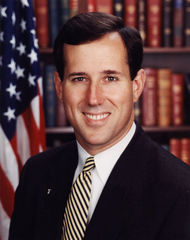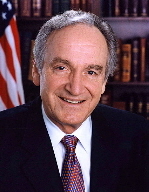Could Rick Santorum Become the First Iowa Caucus One-Hit Wonder?
Santorum could be the only presidential candidate to win the Iowa caucuses and no other state; the current low mark is held by Tom Harkin in 1992 with just two states
 With an 11th hour surge, the once seemingly irrelevant Republican presidential candidate Rick Santorum is hoping that his pitch-a-tent strategy in Iowa pays off Tuesday with a victory in the state’s caucuses.
With an 11th hour surge, the once seemingly irrelevant Republican presidential candidate Rick Santorum is hoping that his pitch-a-tent strategy in Iowa pays off Tuesday with a victory in the state’s caucuses.
The former Pennsylvania U.S. Senator has consistently polled in a very strong third across each of the last half-dozen public opinion surveys conducted of likely caucus voters in the Hawkeye State.
But while the Iowa GOP establishment has been grumbling that a Ron Paul victory on Tuesday would put in jeopardy their state’s relevancy as the first contest in the nation going forward (under the assumption that the Congressman could not ultimately become the party’s nominee), it is unclear that a Santorum victory would alleviate this concern.
For whereas Representative Paul is currently poised to be competitive and rack up delegates in several states (and likely carry some caucus states), Santorum has much bigger financial and organizational hurdles to get his name at the top of the leader board post-Iowa.
And how unusual would it be for a candidate to win Iowa and then strike out thereafter?
A Smart Politics analysis finds that if Rick Santorum wins Iowa and then fails to carry any other state, he will be the only presidential candidate to emerge from the caucuses as a one-hit wonder since its inception 40 years ago.
The fewest number of states a Republican winner of the Iowa caucuses has tallied to date is five with Bob Dole in 1988.
Dole won Iowa, Minnesota, South Dakota, Wyoming, and his home state of Kansas in February that cycle, and then failed to pick up another state as George H.W. Bush cruised to victory.
In 1980, Bush won the Iowa caucuses and just six states overall.
In addition to Iowa, the elder Bush also was victorious in Massachusetts, Connecticut, Pennsylvania, Michigan, and Maine. (Bush also carried Washington, D.C.).
Mike Huckabee, the 2008 Caucus winner, won eight states in his primary run: Iowa, Alabama, Arkansas, Georgia, West Virginia, Tennessee, Kansas, and Louisiana.
No other Republican Iowa caucus victor has carried less than half of the nation’s states, with Gerald Ford at 27 in 1976, George W. Bush at 43 in 2000, and Ronald Reagan (1984), George H.W. Bush (1992), and George W. Bush (2004) winning all 50 states in their unchallenged reelection primary contests.
 The fewest states won by an Iowa caucus victor from either party is Hawkeye State U.S. Senator Tom Harkin in 1992.
The fewest states won by an Iowa caucus victor from either party is Hawkeye State U.S. Senator Tom Harkin in 1992.
Harkin won his home state by more than 70 points that February in a contest essentially conceded by the Democratic field that cycle.
Harkin also carried the Idaho caucuses a few weeks later by less than a point over Paul Tsongas for his second and last victory in the primary season. (Bill Clinton would later claim the Idaho primary decisively in May after Harkin was out of the race).
Two other Iowa Democratic caucus winners only carried a handful of states – Dick Gephardt in 1988 with three states overall and Edmund Muskie with five in 1972 after the first Iowa caucuses.
The remaining Iowa caucus winners on the Democratic side won a substantial number of state contests: Walter Mondale with 26 in 1984, Jimmy Carter with 27 in 1976, Barack Obama with 29 in 2008, Carter with 37 in 1980, John Kerry with 46 in 2004, and Al Gore with 50 in 2000.
Bill Clinton also won all 50 states in his unchallenged primary reelection bid in 1996.
Of course, even though Santorum has not been polling strong in other states to date, an underdog victory in Iowa could propel him to numbers heretofore unseen, so a second win or more would not be inconceivable.
Number of States Won by Iowa Caucus Victors
|
Year
|
Winner
|
Party
|
States won
|
|
1984*
|
Ronald Reagan
|
GOP
|
50
|
|
1992*
|
George H.W. Bush
|
GOP
|
50
|
|
1996*
|
Bill Clinton
|
DEM
|
50
|
|
2000
|
Al Gore
|
DEM
|
50
|
|
2004*
|
George W. Bush
|
GOP
|
50
|
|
2004
|
John Kerry
|
DEM
|
46
|
|
1996**
|
Bob Dole
|
GOP
|
44
|
|
2000
|
George W. Bush
|
GOP
|
43
|
|
1980
|
Jimmy Carter
|
DEM
|
37
|
|
2008
|
Barack Obama
|
DEM
|
29
|
|
1976
|
Jimmy Carter
|
DEM
|
27
|
|
1976
|
Gerald Ford
|
GOP
|
27
|
|
1984
|
Walter Mondale
|
DEM
|
26
|
|
2008
|
Mike Huckabee
|
GOP
|
8
|
|
1980
|
George H.W. Bush
|
GOP
|
6
|
|
1972
|
Edmund Muskie
|
DEM
|
5
|
|
1988
|
Bob Dole
|
GOP
|
5
|
|
1988
|
Dick Gephardt
|
DEM
|
3
|
|
1992***
|
Tom Harkin
|
DEM
|
2
|
* Candidate ran unopposed. ** Not included in Bob Dole’s tally is the Louisiana primary, which he won, although he lost that state’s caucuses to Pat Buchanan earlier in the cycle. *** Included in Tom Harkin’s tally is the Idaho caucuses. Harkin later lost the Idaho primary.
Follow Smart Politics on Twitter.

Can you imagine, if we are to believe the official numbers, Santorum lost by 8 votes. Eight. My personal prediction of a Ron Paul victory in Iowa, and then market sell-off on that news, did not happen. But it still could if he were to surge and win important states and increasing support in the next few weeks.